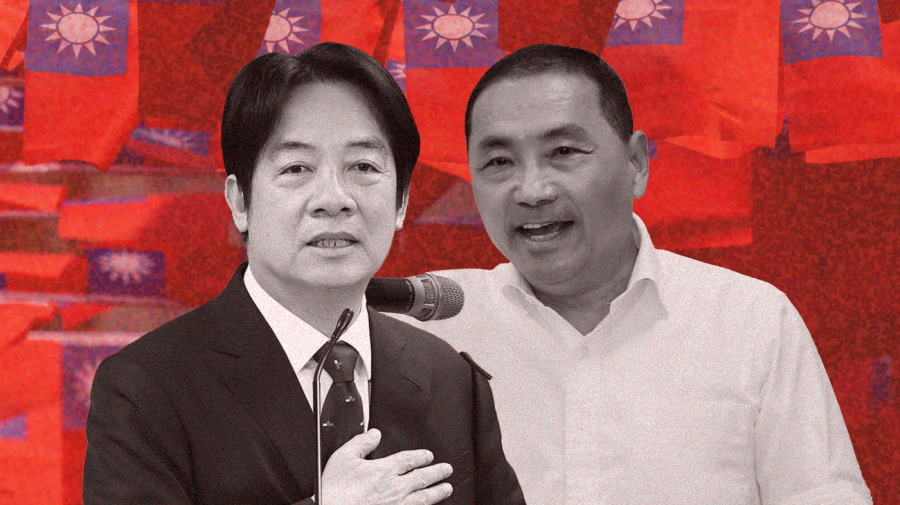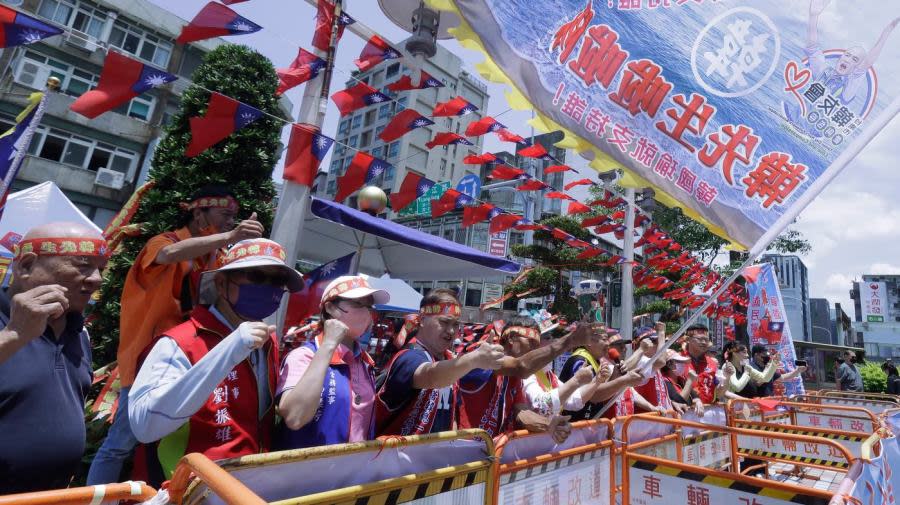What Taiwan’s high-stakes election means for the US-China rivalry
- Oops!Something went wrong.Please try again later.
Taiwan is quickly approaching campaign season in the high-stakes election to replace its president, Tsai Ing-wen.
The outcome will determine how the island’s government positions itself between Washington and Beijing as the two nuclear-armed powers are locked in an intense competition for global dominance, with Taiwan as a key flashpoint.
The main rival to Tsai’s Democratic Progressive Party (DPP) is the opposition Kuomintang (KMT), which has had recent success in local elections, responding to criticisms against the DPP on kitchen-table issues.
But the KMT is criticized by opponents as subservient to the government in Beijing, and the contrast with the DPP was spotlighted during dueling diplomatic trips earlier this year.
Former KMT president Ma Ying-jeou took a high-profile trip to mainland China in April at the same time Tsai was drawing backlash from Beijing for meeting with House Speaker Kevin McCarthy (R-Calif.) in the U.S.
However, the leading candidates for both parties are relatively untested on the international stage. And both parties appear to be staking out a position in line with a majority of Taiwanese, who favor the island keeping its democratic autonomy while holding back from pursuing full-fledged independence, which is a red line for Beijing.
Regardless of the outcome, the election will mark the end of Tsai’s eight years in power. Experts credit her with showing a steel spine in facing down, without provoking, Chinese President Xi Jinping and his professed goal of overtaking the island.
However, the DPP is also battling blame for the slumping economy and lingering anger over its COVID-19 response.
“The young people, they live in a time where DPP was already in power … and they did see some mistakes that the DPP made during our governance,” Andrea Yi-Shan Yang, deputy secretary general of the DPP, said in an interview with The Hill in her offices in Taipei.
“So they’re judgmental and criticize the DPP’s capability of running the country.”
In early June, the DPP became embroiled in allegations of sexual harassment that have triggered resignations and sparked public outcry over the problem of sexual harassment in other professions and industries, drawing comparisons to the #MeToo movement in the U.S.
The DPP’s favorability rating has dropped by half, the Washington Post reported Wednesday, citing the Taiwan Public Opinion Center.
It’s likely to become a key election talking point, with DPP lawmakers already framing the resignations as the party taking responsibility and criticizing its competitors as failing to acknowledge or confront such issues.
On Tuesday, a KMT lawmaker was found liable for sexually harassing a woman DPP lawmaker in 2020 and made to pay $80,000.
It’s unclear how the KMT will address the growing #MeToo movement. But the party’s main selling point is as a peacemaker with China, arguing they are the only party that will prevent a war from breaking out.

The KMT announced New Taipei City Mayor Hou Yu-ih, 65, as its candidate for president on May 17 — a choice viewed as putting forth a competitive and popular contender with strong Taiwanese roots to push back against critics that the party is too close to Beijing.
“Given the very, very tense, very, very unpleasant, and very, very dangerous cross-Strait security situation, another DPP victory in January next year will send a message to Xi Jinping and then make the entire thing ugly,” Alexander Huang, director of international affairs for the KMT, said in an interview with The Hill.
“We should ask the DPP to rest for four years and give Taiwan a break. And give the United States a break. DPP can always win another election, but for our own security, for the peace and stability in the next four years, KMT would be a structurally better choice for the common good and common interest,” Huang added.
The U.S. views its partnership with Taiwan as vital to global stability — a responsible, democratic partner in the middle of critical international waterways where energy, commerce and key technology transit.
The DPP under Tsai has laid out a clear path: Align closely with the U.S. to strengthen Taiwan’s diplomatic clout and military defense to deter a possible Chinese invasion — a position likely to be continued under the party’s candidate for president, 63-year-old Vice President William Lai.
A little more than 14 percent of the Taiwanese population favors the KMT, compared to nearly 31 percent for the DPP, according to the most recent Election Study Center at Taiwan’s National Chengchi University published in January.
A poll by the Chinese-language United Daily News on May 24 gave Lai a slim lead (28 percent) over Hou (24 percent).
But even as the DPP and KMT are the most dominant political forces on the island, support is growing for a third party, the Taiwan People’s Party (TPP). Its chairman and likely candidate, Ko Wen-je, 63, is viewed as a formidable opponent, a charismatic former mayor of Taipei and professional physician. He rated 22 percent in the UDN poll.
“We have a very sharp opposition leader in the Taiwan People’s Party. He’s a hilarious guy,” said Yang of the DPP. “He’s favored by the young people because they think he’s funny and he’s direct and honest. That’s the impression the young people have.”
Ko visited the U.S. in April to introduce himself and the party in Washington and described the TPP as a new middle ground between the DPP and the KMT.
“KMT has always been on the submissive side when working with mainland China, while DPP stop all the channels of communications with PRC. I personally think there is always a possibility to find a space in between the two extremes when handling the cross-Strait relations,” Ko said in a talk with the Center for Strategic and International Studies during his visit.
But DPP officials see no space for ambiguity.
Across the government they espouse laser focus on maintaining what they say is the status quo, holding back from declaring independence even as the island beefs up its self-defense and deepens its relations abroad.
“We don’t talk about sovereignty, we don’t talk about independence, we don’t talk about unification, let’s just stay how it is — that’s status quo,” said Yang.
“But status quo is not unchanged. Status quo is a rolling process,” Yang added. “For example, China is deploying more missiles, that’s change of status quo, change of physical threats on Taiwan.”

Taiwan viewed as a wakeup call a 2019 speech by Xi calling for the “complete reunification” of the island with the mainland and under the “one country, two systems” policy, a warning that its democracy risked being destroyed just like Hong Kong. Yang credited that speech for bolstering support for the DPP in the 2020 presidential election.
And China’s military response in August 2022 to a visit to Taiwan by then-House Speaker Nancy Pelosi (D-Calif.), when it carried out live-fire drills around the island, represented one of the most intense periods of tensions between Beijing and Taipei in recent memory.
U.S. officials have warned that China is preparing to invade Taiwan by at least 2027, though that timeline is hotly debated.
Among the key factors are how much support Taiwan receives from the U.S.; China’s military capabilities and domestic political and economic landscape; and Beijing’s assessment of how Western-democratic unity against Russia over its invasion of Ukraine could be turned on China.
Taiwan officials also fear an economic blockade, which they view as an act of war. U.S. and Taiwanese officials warn that Chinese military actions would not only result in an enormous loss of life, it would also rupture the global economy, militarizing key waterways that transit between 40 and 50 percent of the world’s commerce.
“If that happens, it’s not only the failure of Taiwan, it’s the failure of all the democratic world,” Taiwan Deputy Foreign Minister Roy Chun Lee said in a briefing with international reporters in Taipei in mid-May.
Taiwan under Tsai and the DPP has pushed to strengthen its military capabilities — passing legislation to extend mandatory military service from four months to one year, open up reservist training to veteran women soldiers, and improve combat training.
Huang said the KMT is likely to maintain what the DPP has laid out in strengthening Taiwan’s defense and close ties with the U.S.
“We are the same, that we defend Taiwan, we will keep our relationship with the United States very close, because without the United States, the Republic of China would not be able to survive for that long,” he said, using the formal name for Taiwan.
Still, Huang said that the KMT is also likely to restart dialogue with Beijing.
“DPP say ‘we are open to talk,’” but that China’s political preconditions make communication unacceptable, Huang described.
“For that part, we are different because we believe that to deal with Beijing … we have to recognize that there is a certain degree of ambiguity … to agree to disagree,” he continued.
“Which means that we agree that there is ‘but only one China,’ but oppose that the PRC represents the whole China. That is an ambiguous description.”
Bonnie Glaser, managing director of the Indo-Pacific Program with the German Marshall Fund, said the U.S. is unlikely to view as a risk the KMT’s openness to talks with Beijing.
“I think there has always been concern about the absence of communication channels between the two sides of the Straits since 2016,” she said. “It has heightened the potential for miscalculation and misunderstanding. So just the fact that dialogue would take place is not a bad thing.”
More concerning is whether the KMT would continue policies pursued by the DPP and Washington in recent years, in particular, “building a munition stockpile in Taiwan, which China is worried about,” she pointed out.
“If the Chinese were to put pressure on the KMT and say, ‘you know, we really don’t like that,’ would the KMT back off of some of those things that the Chinese have a high level of sensitivity about? And I think that’s an area where the U.S. probably has more concern,” Glaser continued.
But she added that it will be important over the next months of campaigning to really dig into the positions and policies that the candidates are putting forward, with Lai and Hou relative unknowns to the U.S.
For Lai, even his term as Tsai’s vice president hasn’t allowed for much insight into his priorities or leadership style.
“Right now he is being very careful to echo [Tsai’s] stances. It’s a safe place to be. But it is difficult to know whether ultimately his policies would be different, particularly over time, or how he would react in crisis, or how he might respond as the Chinese start displaying major demonstrations of military force.”
The competition is likely to be tight.
“I think that this is going to be a close race. The KMT is going to give the DPP a run for its money,” she said.
Disclosure: The writer was on a press trip to Taiwan paid for by the Taiwan Ministry of Foreign Affairs. The majority of the interviews were conducted independently.
For the latest news, weather, sports, and streaming video, head to The Hill.

